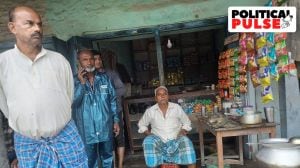Care, concern and a small revolution
CHENNAI, JANUARY 13: In 1962, an English woman resident in India, an Indian farmer and his wife, a Canadian volunteer and a young man from...

CHENNAI, JANUARY 13: In 1962, an English woman resident in India, an Indian farmer and his wife, a Canadian volunteer and a young man from America living in a small, mud-walled house began giving milk to village children and treated their ailments. This was the beginning of Seva Nilayam Society, situated in Rajadhani near Andipatti in Theni District.
Today. Seva Nilayam, the service society supported by Village Service Trust and Ryder Cheshire Foundation now reaches out to more than 2 lakh population in nearly 100 villages. Everyday, nearly 100 new patients come to the main clinic and nearly 150 patients check their health. Just for Rs 2. Patients from outside the project area are charged Rs 5. They get free injections and take home boxes full of medicines.
In a separate TB ward, the patients receive the best treatment free of cost irrespective of their residing area. The patients are treated for 6 months during which they get the much needed nourishment. Every year, more than 100 TB patients breath backlife and most of them are rehabilitated.
“Efforts are now being taken to prevent the spread of TB in the project area. About 65 village guides, mostly women have been selected to identify, monitor and ensure that the TB patients take the needed medicines without fail. These volunteers work by the DOTS (Directly Observed Treatment, short course) scheme in which they put the medicines in the patients mouth and make sure they swallow it every time throughout the treatment period”, says a young Dr S Chandrasekar who satisfies his self by working here.
To cure and prevent Sexually Transmitted Diseases, an integrated approach is undertaken. “As the STD patients in rural areas are afraid to be seen visiting STD clinics, they let the diseases spread to others. To solve this problem, in the village sub centres of Seva Nilayam where maternal and child welfare schemes are implemented, women are diagnosed for STD’s. If the woman proves positive, then her partner is also invited for counselling and treatment. Asthe number of HIV positive patients is on the increase, awareness campaigns are also conducted through exhibitions and street plays. Along with the awareness, high quality condoms are being distributed. In the rural areas, men are the real culprits” adds Chandrasekar.
Seva Nilayam is famous for its treatment of human skin. The local belief is that all kinds of skin diseases are cured here. There is a herbal farm in which 150 species are grown, and the needed powders, ointments and lotions are prepared inside the campus itself. People from other states come and retain their shining skin. Homeopathy and Siddha doctors also visit the main clinic thrice a week.
Improving the health of the rural poor is now combined with enhancing their socio-economic status. About 130 Village Help Groups or Sangams have been formed with a total membership of 2,272 women. A Sangam is a group of about 15-25 people who meet on a regular basis to discuss village and personal problems and to participate in a micro-creditscheme.
“As there is a pressing need for women to have access to money, Seva Nilayam grants loans to individuals of a particular group based on their functioning. These grants have to be repaid not by the individual but by the group” said A Vijayaraman, the Director of the organisation. The plan is to handover the service organisation fully in the hands of women in a few years time. Women are trained to participate and function in local body politics also.
Training programmes in producing and marketing of washing powder, liquid bluem pickles, pen ink, sisal fibre and coir products are conducted for the women. Screen printing, tailoring, nurse-aid courses are offered. Dalit women are trained on mother, child health and first aid training. Families are trained under the State Governments Central Rural Sanitation Programme.
Arogya Aham and Vasantham, the two outreach programmes of Seva Nilayam are autonomous institutions now and are competing with the parent body in terms of service.
Arogya Aham treatsleprosy patients and Vasantham is in the process of empowering tribal women.



- 01
- 02
- 03
- 04
- 05




























